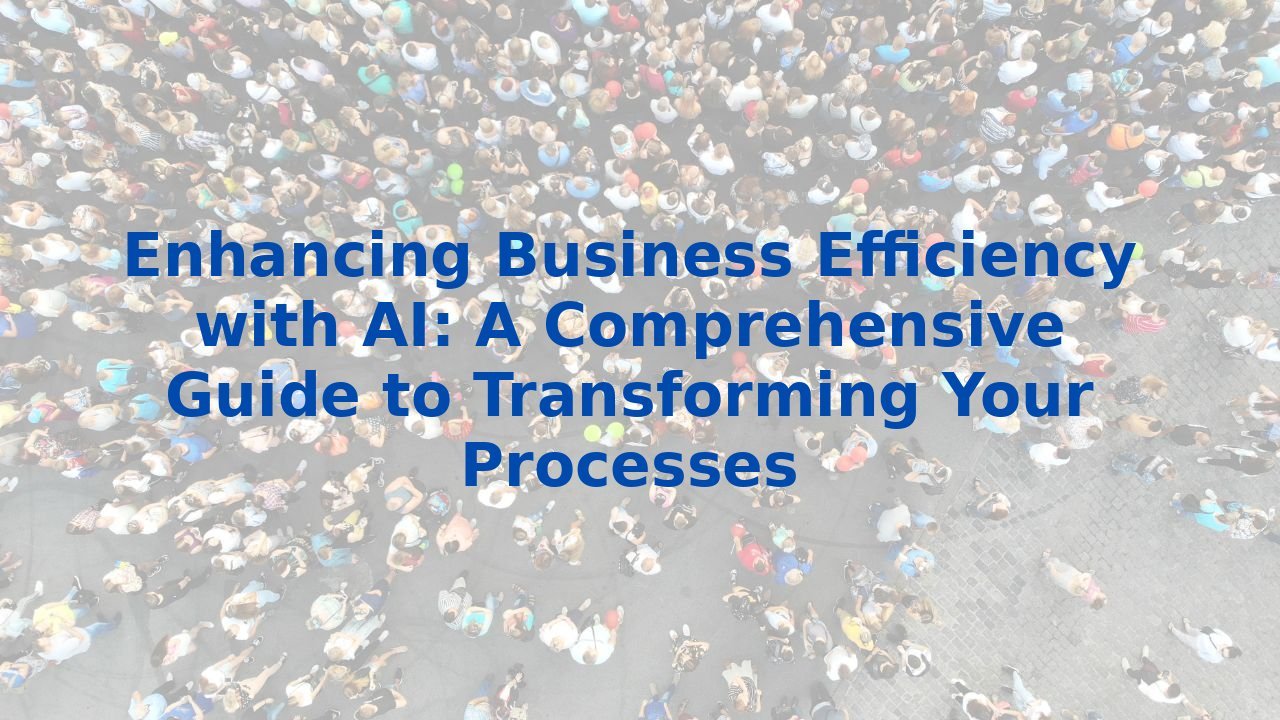Enhancing Business Efficiency with AI: A Comprehensive Guide to Transforming Your Processes
Enhancing Business Efficiency with AI: A Comprehensive Guide to Transforming Your Processes
In an era defined by rapid change and relentless competition, efficiency is the lifeblood of any thriving organization. Enter artificial intelligence (AI)—a game-changing force that promises to redefine how businesses operate. By integrating AI into your processes, you unlock unprecedented potential to streamline operations, reduce costs, and enhance decision-making.
Understanding AI Process Optimization
At its core, AI process optimization involves deploying AI and machine learning technologies to elevate business process management. This encompasses the analysis of vast data sets, automation of repetitive tasks, and support for your team in making informed decisions. The ultimate aim? To minimize errors, boost productivity, and enhance operational efficiency.
Key Benefits of AI in Business Process Management
AI is not just a buzzword; it offers tangible benefits that can transform your business landscape. Here are some key advantages:
1. Process Discovery and Mapping
With AI's capabilities in process mining and pattern recognition, organizations can uncover existing workflows with remarkable precision. This insight facilitates the creation of accurate process maps, keeps documentation up to date, and highlights areas ripe for improvement.
2. Process Automation
Imagine freeing your team from the drudgery of manual tasks. AI bots can seamlessly handle activities like data collection, invoice processing, and even scheduling social media posts. This not only reduces manual effort but also allows for more complex, strategic tasks to take center stage.
3. Process Management and Improvement
AI does not merely observe; it actively monitors processes, using historical data to signal management regarding potential issues. This leads to data-driven insights, predictive modeling, and root cause analysis—all pivotal in driving sustainable improvement.
4. Enhanced Decision-Making
In the face of complex decisions, AI shines, providing extensive information and simulating various scenarios. By processing structured and unstructured data from countless sources, AI empowers decision-makers to choose wisely and confidently.
5. Risk Prediction and Real-Time Monitoring
With its characteristic vigilance, AI can detect anomalies in data that may pose risks to business processes. Furthermore, real-time monitoring allows companies to seize opportunities or address challenges before they escalate.
Practical Applications of AI in Business Processes
The functions of AI stretch across various domains, showcasing its versatility in enhancing business processes:
1. Document Processing
Intelligent document processing (IDP) harnesses AI to transform documents into actionable data without needing human intervention. This mitigates errors and increases the speed at which sizable volumes of documents are managed—streamlining workflows like never before.
2. Customer Service Optimization
AI can revolutionize customer interactions by analyzing feedback, extracting essential data, and feeding it directly into ticketing systems. This proactive approach not only improves service quality but also enhances the overall customer experience.
3. Supply Chain Management
AI models can scrutinize real-time purchase data to identify anomalies, such as unexpected spikes in demand. By providing timely alerts, AI enables retailers to adjust inventory levels rapidly, ensuring they are equipped to meet customer needs.
4. Predictive Analytics
By studying market trends and consumer behavior, AI can forecast customer actions, allowing businesses to tailor strategies that resonate with their audiences more effectively.
The Role of Employee Training in AI Integration
While AI's capabilities are impressive, the true power of this technology is unleashed when paired with skilled human talent. An effective training program can elevate your team, equipping them to harness AI to its fullest potential.
1. Understanding AI Capabilities
Employees must comprehend how AI functions and recognize its limitations—knowing when to rely on AI and when human judgment reigns supreme is crucial.
2. Data Analysis Skills
As teams interact with AI, possessing baseline data analysis skills becomes fundamental. Employees should be adept at interpreting AI-derived insights and leveraging data visualization tools to derive meaningful conclusions.
3. Adaptability
In a landscape that continually evolves, adaptability is key. Regular training ensures your workforce stays abreast of the latest AI advancements and can incorporate them into daily practices.
4. Ethical Considerations
AI brings forth ethical dilemmas that must be navigated responsibly. Ensuring that employees are well-versed in ethical AI use protects your organization and fosters a culture of integrity.
Conclusion
AI process optimization is no longer a luxury; it’s a necessity in the modern business ecosystem. The advantages it offers—enhanced productivity, reduced costs, informed decision-making—forge the path to sustainable success. But for organizations to maximize AI's potential, tailored training for employees is paramount. Together, these strategies create a robust foundation for innovation and growth, ensuring your business remains agile and competitive in a rapidly evolving landscape.
Discover how your organization can embark on a transformative journey with AI by equipping your workforce with the necessary skills. Explore tailored training solutions for large businesses and enterprises, ensuring everyone is ready for a future powered by AI.



